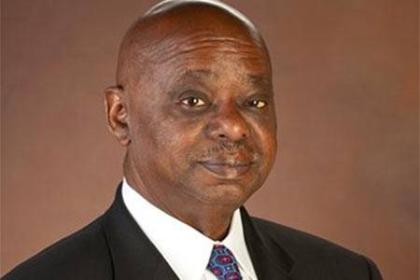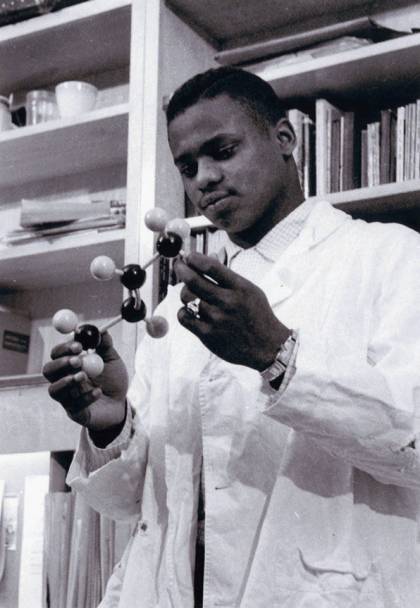Highly respected neurosurgeon and entrepreneur Ernest A. Bates, who in 1958 became the first Black student to graduate from Johns Hopkins University's Krieger School of Arts and Sciences and later served on the university's board of trustees for nearly two decades, died on March 19. He was 87.

Image caption: Ernie Bates
Bates led a thriving medical practice in the San Francisco area and was the founder, CEO, and chairman of American Shared Hospital Services, a publicly traded company founded in 1977 that leases state-of-the-art medical equipment to hospitals and medical centers in the U.S. and around the world. He was also a partner in Black Coyote Chateau, a winery in Napa, California.
In 2021, Bates received a Johns Hopkins honorary degree, the university's highest honor, "for being a pioneering force for change and champion of equity at Johns Hopkins and beyond," according to the degree citation.
"I was lucky—I had a room directly across the hall from his room as a freshman," said Jack Ruffle, a fellow member of the Johns Hopkins Class of 1958 and later a partner in Bates' winery venture as well as lead director of the American Shared Hospital Services board for 25 years. "So I met him in September 1954 and he became a friend, and we were friends for life.
"He was always so thoughtful—he really cared about his friendships. You could always count on Ernie giving you good advice when you needed it. Everything about Ernie I respected. I think the world of Ernie."
Bates began pursuing his dream of becoming a doctor by studying biology on a full academic scholarship at Hopkins, where he was also a member of the football and track teams. When he arrived on the Homewood campus from his hometown of Peekskill, New York, he was one of just a few Black students at JHU, and the first to live in a campus residence hall. He was initially disappointed to discover that he hadn't been assigned a roommate—an effort by the university to avoid subjecting him or his roommates to any discrimination they might encounter from other students. Such concerns were unfounded: Within a day, Bates had heard from 20 white students who eagerly volunteered to be his roommate.
"That wonderful and welcoming response from my fellow students set the tone for my entire college experience at Hopkins," Bates said in remarks delivered in 2003 upon being honored by the university with a Heritage Award for his many achievements and contributions. "I saw the compassion, sincerity, and goodwill of Hopkins students. It was the first of countless acts of goodwill that have been repeated over and over again during the last 50 years."
Rather than accept an offer from any prospective roommate, he turned his room into a haven for Black students from Baltimore, giving them a place to meet; leave their books, lunches, and coats between classes; or even sleep over the night before a big exam. It was a practice he kept up for all four years at Hopkins, even when he later had roommates.
"Within days of arriving on campus, you became a unifying presence among your fellow students, opening doors to those who came behind you," JHU President Ron Daniels said in remarks recognizing Bates during the 2021 Commencement ceremony. "That spirit carried you far in your life of service as an airman, neurosurgeon, entrepreneur, philanthropist, and champion of equitable medical care for those in underserved communities."
In his 2003 remarks, Bates recalled traveling by bus with the football team to play a game in the Jim Crow South. On the way home, the team stopped to eat at a restaurant, where they were told Bates could not come inside. The team captain spoke up, Bates said, saying "Ernie is our teammate. He goes where we go. If he can't go into the restaurant, we don't eat here."

Image caption: Ernest A. Bates as a Johns Hopkins undergraduate, circa 1958
Image credit: Johns Hopkins University, Sheridan Libraries, Ferdinand Hamburger University Archives photograph collection
The team drove another two hours before finding an integrated restaurant where everyone could eat together.
"This is the kind of morally correct attitude that makes Hopkins and its students great," Bates said.
After receiving his bachelor's degree from Hopkins, Bates earned his medical degree at the University of Rochester School of Medicine & Dentistry in 1962 and completed an internship at Albert Einstein College of Medicine, Bronx Municipal Hospital Center, in 1963. He then joined the Air Force and served in Japan for three years. Following his service, Bates completed his neurosurgery residency at the University of California, San Francisco, becoming one of the first three Black board-certified neurosurgeons in the United States.
Even after leaving campus, Bates remained closely connected to his alma mater throughout his life. He served on the board of trustees from 1988 to 2006, including stints as vice chair and as chair of the annual fund. He also was an honorary member of the Krieger School advisory board as well as a member of the Johns Hopkins Medicine and Johns Hopkins Neurosurgery advisory boards. His legacy includes significant philanthropic support to JHU over the years, including to the Donlin M. Long, M.D., Professorship in Neurosurgery at the School of Medicine. In 2021, the university recognized Bates by naming a residential tower in his honor.
Bates established the Ernest Bates Foundation in 2004 to support nonprofit health care organizations serving African American and Latino communities. The foundation created the Sally Bates Endowed Chair in Health Disparities at the UCSF School of Nursing in honor of his mother, who at age 70 returned to school to become a licensed vocational nurse after having worked for years as a janitor.
"I credit my Johns Hopkins education with giving me the tools to have a successful career and develop lifelong friendships," Bates said in 2003. "The intellectual curiosity and character traits hammered into us by our Hopkins professors helped me continue being a pioneer and innovator throughout my life."







